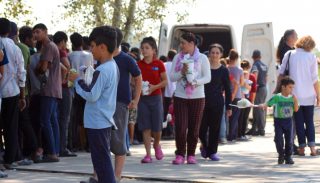Co-founded in late 2016 by Jane Goldsmid and Nick Watts, Migrant Family Action have been slowly recruiting a range of professionals and volunteers across social work, education, health and more as well as growing the caseload of people they can support. During a trip to London they spoke with the Leveller, sharing the story behind the organization, the challenges of providing a support network across borders and the specialist approach taken to their work.
Jane is a qualified social worker currently working in child protection and court proceedings and previously with the youth offending service and then a family support team. She was born and brought up in pre- and post-apartheid South Africa which she says has “been a huge influence in the way I work and the way I want things to work for other people.” Nick’s background is in family and youth work with a more therapeutically-driven focus: “I do a lot more intervention-type work, mentoring and so on. I’ve also worked across mental health, particularly with men and boys.”
Despite being disillusioned at points through their years of experience in social work, they had never imagined they would set up their own organization. The motivation grew out of self-funded trips to volunteer in Calais and later, during the demolition process, trying to support those who were taken to separate camps for unaccompanied minors (Centre d’accueil et d’orientation pour mineurs isolés étrangers – CAOMIE). We spoke about the challenge of providing support during this period and the adequacy of CAOMIEs to meet children’s needs.
Nick – “In the camp the day-to-day work involved safeguarding and trying to account for the kids we supported, that was the norm. While the demolition was chaotic, because of the registration process that took place it made it easier to find people because we knew where they would be, although a lot of people simply ran away before the demolition. As for the CAOMIE’s meeting their needs? No. I would argue that it put a roof over their head. It gave them warmth, sometimes.”
Jane – “I suppose it met the basic needs of the kids in terms of food, a roof over their head, somewhere to have a bath or shower and limited access to medical help if they needed it. But in terms of proper safeguarding and basic rights such as schooling, that sort of thing? No.”
Nick – “We went to visit a centre in December to find the night before there had been a massive brawl and a near-fatal stabbing. We found out the young people were housed with homeless alcoholic adults in the same centre. There’s all the reports from other centres about there not being enough food, no education, children running away. While they aren’t perfect, the problem remains that they’re going to shut eventually and then those thousands of young people who got rehoused but haven’t got a clear place to go are in serious trouble.”
There are groups working in Calais, doing their best to support the children who remain there, sleeping in dispersed camps or in ditches or the forests, wherever they can. Beyond, there are strong campaign voices that are challenging government actions, the lack of material support and racist scapegoating. The work of Migrant Family Action is driven by the need for a network of support and mentoring that doesn’t just stop in camps or at the borders but continues alongside the person’s life once they are settled, whether that be in the UK or elsewhere.
The problem Jane and Nick want to try and overcome is the cases where a child is for example dropped off at their last remaining relative’s doorstep and left to figure out the next steps. They bring together shared expertise as well as collaboration with other organizations to support those who fall through the cracks or have their rights denied amid the Conservative government’s ‘hostile environment’ (outlined in detail here by North East London Migrant Action).
Jane – “At the centre it’s about the connection we’ve made with people when we meet them in France and then following and supporting them through their journey. We would then continue that when they’re in the UK for example. Nobody does that. Nobody follows through. Anybody who supports them in France, once they get to the UK that’s it, their reach ends. This is really important as they’re still vulnerable when they get to the UK, it’s a different kind of risk.”
Nick – “I don’t like the word ‘integration’ as I think it suggests there’s something they need to change to be part of our society, but we try to help them acclimatize to life in the UK and get their basic needs met. Our interventions are very flexible, different families might have wildly different needs so we listen, understand their context, what they need and build from there.
Between us we’ve got 20 years of experience in child protection and we can bring all that in, refer to theory and frameworks, go into child development and talk about what will happen if these needs aren’t met and provide that broader context. It’s harder to say no to someone when they’ve got an assessment written by an ally-professional that’s based on evidence and reinforced to that kind of level.”
Surrounding their advocacy work they focus on the need to ‘re-knit’ a person’s web of relationships, which they do through referrals to youth clubs, English classes, religious organizations, college and more. Through this, they hope to build resilience and a network of support that, once substantial enough, would mean they’re no longer needed so directly and people can ‘self-advocate’.
At the centre, it’s clear that settlement in the UK or elsewhere isn’t the end of the story however. Beyond the hostile political climate, fears of violence and abuse, the challenges of engaging with the Home Office, housing and other support services, there is also the deeper work of beginning to address the impact of their past experiences.
Jane – “You’re talking about children who have progressed and experienced extreme conditions – walking across Europe, coming across the Mediterranean in boats, seeing their friends’ or relatives’ bodies being dumped off the side of jeeps in the desert, not knowing if they’re going to make it to the other side. So just coming into our society is adding another trauma to what they’ve already experienced and it’s about making that process as easy as we can.”
Nick – “I think there’s a lot of focus on aid in the refugee process and not enough of a focus on psycho-social needs – the need to feel safe, the need to feel a sense of belonging, to be able to eventually address cases where for example children’s parents have been murdered, imprisoned, lost or feared dead. Those kinds of experiences are almost irreparable and they will haunt.
There was one time when a boy was trying to teach me this card game, through a language barrier. I was terrible and he found it hilarious. We later got to the stage of discussing family, but through the universal medium of stick figures. There was this moment where, as we were drawing family, he just started crossing them out and doing this [rests his head on his hands, eyes closed]. We used pictures for the next 40 minutes and using cartoon strips he told me his story, what happened to his family and how he made it to Calais.”
Evidently there is a broader political context that any refugee and asylum seeker support work must contend with. A somewhat improvised support network has sought to respond to the refugee crisis with the resources it can muster, stretching from ‘No Borders’ camps to larger humanitarian organizations.
The current danger is that governments are all too willing to allow these collectives and organizations to ‘fill the void’, leaving refugee support to be provided by a sometimes fragile, largely volunteer-driven network that needs greater resources. I asked how organizations like Migrant Family Action can balance support work while also challenging this process or whether you had to choose.
Jane – “Honestly I think it’s going to get harder. I think for us it’s about working with what we have and what we’re able to offer resource wise, whether that’s to help people here or in Europe. Ok, there was the withdrawal of the Dubs scheme but then you have to look and say well what have we got? How can we best support people with the framework we have? We personally don’t have the resources to push against it and there’s lots of good people with strong campaigning voices that are doing that.”
Nick – “One of the main issues in the UK is something called ‘no recourse to public funds’ – people with certain immigration statuses quite often will have an NRPF addition to it. It essentially means if you’re in trouble, the state owes you nothing. For a lot of families, for example if a family is under threat of homelessness, because of NRPF the housing office will turn around and say no we’re not housing you, even if there’s two children and a mother who risks being put out on the streets. For us, the support of those caught up in these kinds of situations takes precedence. Our voice is frankly going to be small fry compared to others. I think there is room for our voice but I think it’s slightly different, much more in terms of sharing practice.
One thing we eventually want to do is bring our ex-clients on board with us, we want ex-clients on our management committee long term. They should be telling us what works. They’re the experts in their own lives and experiences. We should be trying to get these stories and experiences through, the most genuine version we can. Long term it needs to be their voices at the front.”
While the socio-political context of refugee support in Brexit Britain is daunting, hearing the stories and impact Migrant Family Action have already had on the lives of those they’ve worked with show the value of pressing ahead, doing the best with the resources available.
At present the organization is self-funded and case work is carried out around their ‘day jobs’. They have recently opened up for public donations via their website as well as reporting some interest from individuals who want to help. Against the odds and those at the dinner table who would look down on their work and the people they support, it is clear they’re not going to be deterred.
Jane – “We want to get ourselves out there, to let people know they can turn to us for support, other organizations can reach out to us to work and collaborate. I think that all of us are of the mind that even if no one gives us the funding, we’ll find a way to work it and self-fund. I didn’t get involved in this for it to be a fly by night project, a charity that’s here one moment and gone the next. We’re in it for the long haul.”
Image: Trocaire



